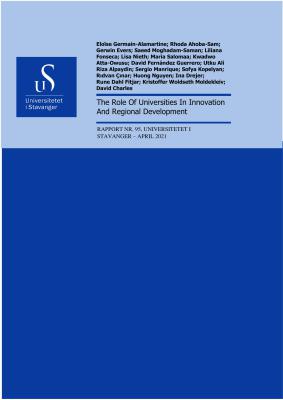The Role Of Universities In Innovation And Regional Development
Keywords:
Universities, Innovation, Regions, Economic Development, Engagement, Third Mission, Higher Education Policy, Innovation Policy, Doctoral EducationSynopsis
Various societal actors are increasingly looking to partner with universities to increase their potential for innovation and solve broader societal challenges. Firms increasingly pursue open innovation strategies, using knowledge from a wide range of sources in their innovation processes. Public sector agencies need to do more with fewer resources, leading them to work more systematically with innovation than before. Governments look to partner with universities to support the development of policies based on new insights from scientific research. Although there are questions about the general public’s continued faith in universities in light of growing populist movements, more and more young people go to university. Meanwhile, universities also have increasing ambitions to contribute to society. The rise of this so-called third mission and the development of models of the entrepreneurial university, the engaged university, or the innovative university all reflect these developments.
As a result, new forms of partnerships are emerging between universities and other societal actors around them. In contrast with the old, linear model, which saw the university as the main source of knowledge, these new forms of interaction involve collaboration between various actors in the development and use of knowledge. Collaboration is not just associated with the third mission of the university, but runs through all its missions: research funders expect universities to work with non-academic actors in the cocreation of knowledge, and educational authorities expect universities to work with employers to enhance the career relevance of their study programmes.
Due to the need for frequent and intense interaction, these partnerships often form at the regional scale. Although universities are global institutions and their academics are embedded in global networks with other researchers, their relationships with non-academic stakeholders are predominantly local or regional. Therefore, these partnerships are shaped by the regional context and vary across different territories.
In this innovative training network on the Role of Universities in Innovation and Regional Development (RUNIN), we have examined the various roles of universities in different regional contexts. It includes 14 PhD projects with researchers based in seven European regions: Aalborg (Denmark), Aveiro (Portugal), Barcelona (Spain), Lincoln (United Kingdom), Linköping (Sweden), Stavanger (Norway), and Twente (The Netherlands). The network is based on the uropean Consortium of Innovative Universities, an organisation of universities that actively seek to contribute to innovation in the regions where they are located. These regions are often relatively peripheral and distant from capital cities. Hence, the universities and regions studied in the project differ substantially from the contexts in which the regional role of universities is commonly studied.
The network has involved researchers in innovation studies, regional studies, higher education, entrepreneurship, economics, and public policy, allowing for a variety of disciplinary perspectives to be used in the analyses. It also includes close collaborations with regional development agencies or governments in each of the seven regions. The 14 PhD fellows have regularly spent time at these agencies, and interactions with regional stakeholders have been an integral part of the training weeks in each region. The findings emphasise the multi-faceted nature of the role of universities in innovation and regional development.
Universities engage with various societal stakeholders, including firms, regional governments, voluntary associations, and citizens. They contribute not just to technological innovation, but also service, public sector, and social innovation. In many cases, universities partner with regional governments to develop regional innovation and development policy, such as smart specialization strategies. They interact for research, to provide education, and to perform broader third-mission activities.
Furthermore, universities are themselves loosely interlinked institutions consisting of relatively autonomous actors. They comprise academics, students, administrations, and senior management. These actors may have different interests and contribute independently to regional innovation processes. Hence, analysing universities as singular entities may not be appropriate.


